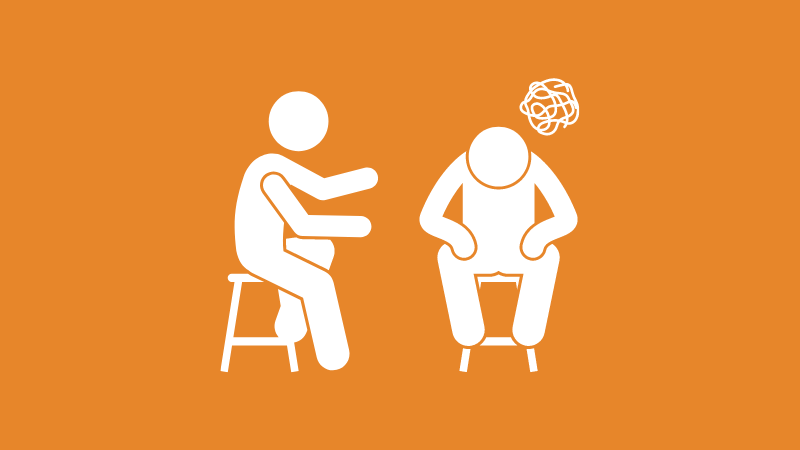Table of Contents
Affiliate link notice: As an affiliate of BetterHelp and other third-party vendors, We will receive compensation if you make a purchase using the links provided on this page. For more information, visit our disclosure page.
Last Updated on April 12, 2023 by Randy Withers, LCMHC
The ketogenic diet, or keto diet for short, has gained immense popularity in recent years for its potential to aid in weight loss, improve energy levels, and enhance physical performance. However, beyond its physical benefits, the keto diet has also been found to have positive impacts on mental health.
Mental health and wellness are vital aspects of our overall health. Our mental state affects how we think, feel, and behave, and has a significant impact on our daily lives. Many factors can influence mental health, including diet. research all but confirms that our dietary choices play a role in the development and management of mental health conditions.
In this article, we will explore five mental health benefits of the keto diet, shedding light on how this dietary approach may contribute to overall mental well-being.

5 Mental Health Benefits of the Keto Diet
The keto diet, characterized by its low-carb, high-fat, and moderate-protein macronutrient ratios, has been found to have several mental health benefits. Let me dive deeper into each of these benefits:
1 Reduced Inflammation and Improved Brain Health
Inflammation in the body has been linked to various mental health conditions, such as depression and anxiety. The keto diet has been shown to reduce inflammation in the body, which can have a positive impact on mental health. By limiting carbohydrates, the keto diet minimizes the production of inflammatory markers and promotes an anti-inflammatory state. This reduction in inflammation can potentially improve brain health and function, leading to better mental well-being.
Moreover, the keto diet has been shown to support brain health by providing an alternative source of energy for the brain – ketones. Ketones are produced during the metabolic process of breaking down fats for energy in the absence of carbohydrates. Ketones are a more efficient source of energy for the brain compared to glucose, and they have been shown to enhance cognitive function, including memory and focus.
This improved brain health can positively impact mental health, leading to better cognitive performance and overall well-being.
2 Stable Blood Sugar Levels and Balanced Mood
Fluctuations in blood sugar levels can have a significant impact on mood swings and emotional stability. High-carbohydrate diets can cause spikes and crashes in blood sugar levels, leading to mood swings, irritability, and fatigue. The keto diet, with its low-carb nature, promotes stable blood sugar levels, which can help balance mood and emotions.
By limiting carbohydrates and relying on fats as the primary source of energy, the keto diet can prevent the rapid rise and fall of blood sugar levels. This can help stabilize mood, reduce mood swings, and promote emotional balance. Moreover, the keto diet encourages the consumption of healthy fats, which are crucial for brain health and the production of hormones that regulate mood. This balanced approach to nutrition can have a positive impact on mental health and emotional well-being.
When you opt for an intermittent fasting keto diet, it will allow you to reach ketosis sooner than keto on its own. Research suggests that such a diet provides mental clarity and better brain health. Usually, when you fast but consume a high amount of carbohydrates at the same time, it can lead to blood glucose level swings. This, in turn, leads to brain fog.
3 Increased Production of Serotonin and Dopamine
Serotonin and dopamine are neurotransmitters that play a critical role in regulating mood and emotions. Serotonin is often referred to as the “feel-good” neurotransmitter, as it contributes to feelings of happiness and well-being. Dopamine, on the other hand, is involved in motivation, reward, and pleasure.
The keto diet has been found to increase the production of serotonin and dopamine in the brain. Ketones, which are produced during the metabolic process of the keto diet, have been shown to enhance the synthesis of serotonin and dopamine. This increased production of these neurotransmitters can positively impact mood regulation, leading to improved mental health and emotional well-being.
By promoting a healthy balance of serotonin and dopamine, the keto diet may help reduce symptoms of depression, anxiety, and other mood disorders.
4 Enhanced Mental Clarity and Focus
Cognitive function, including mental clarity and focus, is crucial for daily life activities, such as work, school, and decision-making. The keto diet has been shown to enhance cognitive function, leading to improved mental clarity and focus.
The brain is a highly energy-dependent organ, and it requires a constant supply of fuel to function optimally. The traditional Western diet, high in carbohydrates, can cause fluctuations in blood sugar levels, leading to brain fog and difficulty in concentration. In contrast, the keto diet provides a stable source of energy to the brain in the form of ketones, which can enhance mental clarity and focus.
Furthermore, the keto diet encourages the consumption of healthy fats, such as avocados, nuts, and seeds, which are rich in omega-3 fatty acids. Omega-3 fatty acids have been shown to have neuroprotective effects and promote brain health. These healthy fats can support cognitive function, memory, and focus, leading to enhanced mental clarity and improved overall mental well-being.
5 Reduced Anxiety and Stress
Anxiety and stress are common mental health issues that can significantly impact daily life and well-being. The keto diet may offer some mental health benefits by reducing anxiety and stress.
Research has shown that the keto diet can help regulate the production of stress hormones, such as cortisol. Cortisol is a hormone that is released in response to stress, and prolonged high levels of cortisol can contribute to anxiety and other mental health disorders. The low-carb nature of the keto diet helps stabilize blood sugar levels and reduces the production of cortisol, leading to decreased anxiety and stress.
Additionally, the keto diet promotes the consumption of nutrient-dense foods, such as vegetables, nuts, and seeds, which are rich in vitamins and minerals that are essential for mental health. For example, magnesium, a mineral found in many keto-friendly foods, has been shown to have calming effects on the nervous system and can help reduce anxiety.
Furthermore, the keto diet’s emphasis on healthy fats can also support brain health and function, as mentioned earlier. A healthy brain is better equipped to handle stress and anxiety, and by providing the brain with the right nutrients and energy source, the keto diet can potentially reduce anxiety and stress levels.
Final Thoughts
In conclusion, the keto diet may offer several mental health benefits. By reducing inflammation, stabilizing blood sugar levels, promoting the production of serotonin and dopamine, enhancing cognitive function, and reducing anxiety and stress, the keto diet can potentially improve mental well-being and contribute to overall better mental health.
It’s important to note that the keto diet may not be suitable for everyone and should be approached with caution, especially for individuals with certain medical conditions or dietary restrictions. Consulting with a healthcare professional or a registered dietitian before starting any new diet is always recommended. Additionally, it’s essential to incorporate a well-balanced diet, regular exercise, and other healthy lifestyle practices as part of a comprehensive approach to mental health and well-being.
FAQ about keto and mental health
1: What is the keto diet and how does it affect mental health?
The keto diet is a low-carb, high-fat diet that aims to shift the body’s primary source of energy from carbohydrates to fats, resulting in a metabolic state called ketosis. Ketosis is known to have various effects on the body, including potential impacts on mental health.
2: Does the keto diet improve mood and reduce depression?
Research suggests that the keto diet may have a positive impact on mood and depression. The diet’s ability to stabilize blood sugar levels, reduce inflammation, and enhance brain function may contribute to improved mood and decreased symptoms of depression.
3: Can the keto diet help with anxiety and stress?
The keto diet may potentially help with anxiety and stress by regulating stress hormones, stabilizing blood sugar levels, and promoting the production of neurotransmitters such as serotonin and dopamine, which play a role in mood regulation.
4: Are there any potential risks or side effects of the keto diet on mental health?
While the keto diet may have potential benefits for mental health, it’s essential to be aware of potential risks and side effects. Some individuals may experience keto flu, which can cause temporary mood changes, and the diet may not be suitable for everyone, especially those with certain medical conditions or dietary restrictions.
5: How does the keto diet affect cognitive function and brain health?
The keto diet may have a positive impact on cognitive function and brain health. The diet’s emphasis on healthy fats as an energy source for the brain, along with reduced inflammation and improved blood sugar control, may support optimal brain function and cognitive performance.
6: Can the keto diet be combined with other mental health treatments?
The keto diet can potentially be combined with other mental health treatments, but it’s essential to consult with a healthcare professional or a registered dietitian to ensure it’s safe and suitable for an individual’s specific needs and circumstances.
7: Is the keto diet a long-term solution for mental health?
The keto diet’s long-term effectiveness for mental health is still being researched, and it’s important to consider individual differences and preferences. While the diet may offer potential benefits, it’s crucial to adopt a comprehensive approach to mental health that includes a well-balanced diet, regular exercise, and other healthy lifestyle practices.
Additional Resources
- Ketogenic diet and mental health
- New Study: Serious Mental Illness Improves on Ketogenic Diet | Psychology Today
- The use of the ketogenic diet in the treatment of psychiatric disorders – PMC


![How To Start Your Own Mental Health Blog A Complete Guide For Beginners [2021]](jpg/how-to-start-your-own-mental-health-blog-a-complete-guide-for-beginners-2021.jpg)





